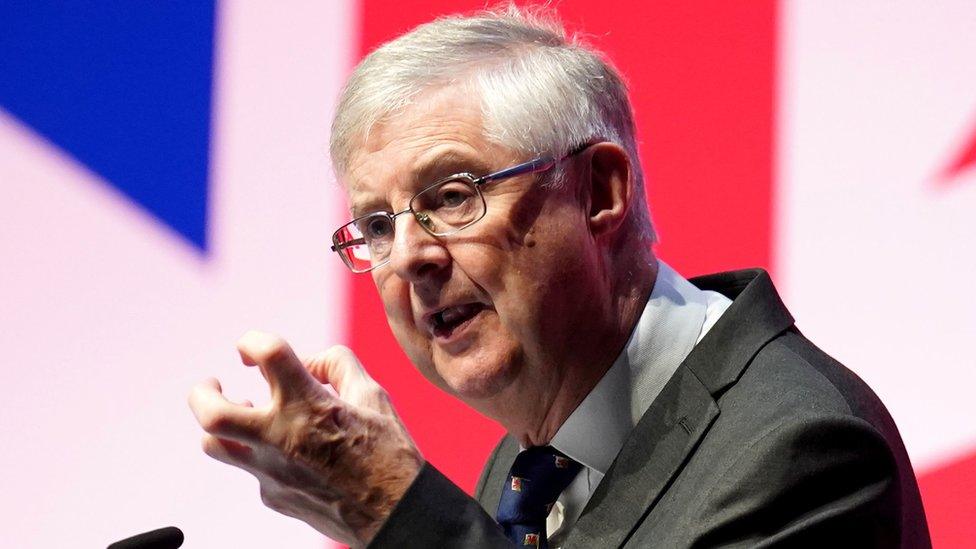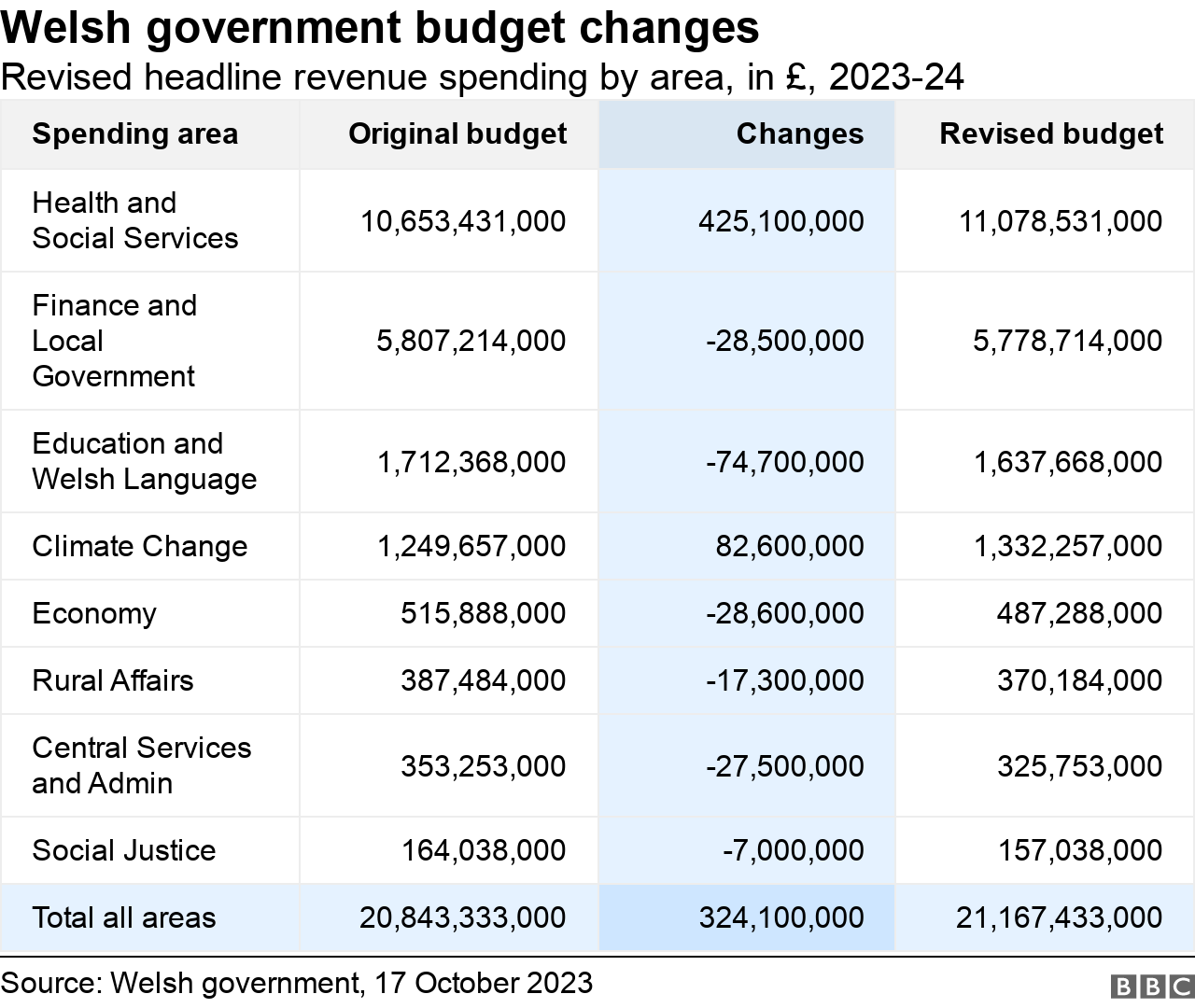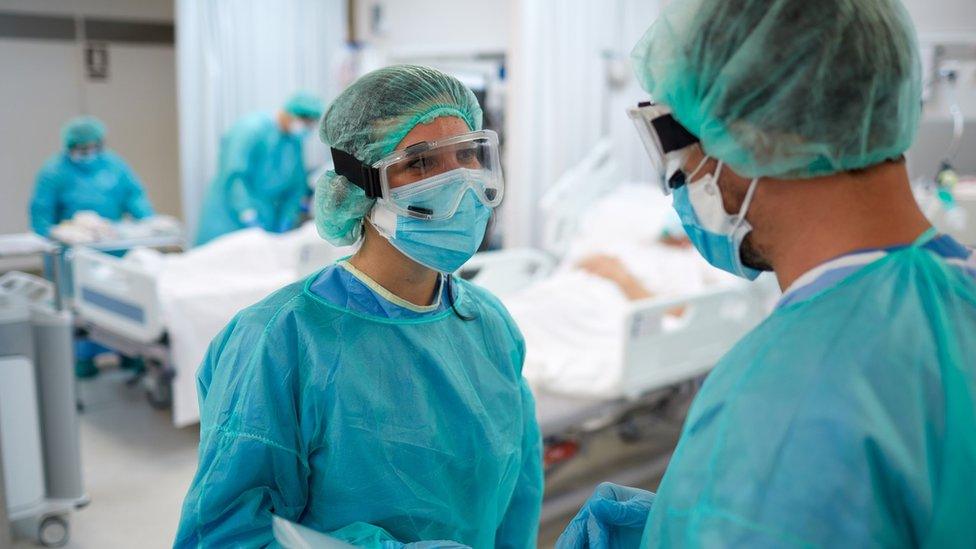Mark Drakeford makes 'crisis' cuts to prop up NHS and trains
- Published

Health services are likely to be spared further cuts
Cuts have been made throughout the Welsh government's budget to move cash to the NHS and to keep trains running.
First Minister Mark Drakeford said a funding crisis means his administration had to find £600m to balance their books between now and next April.
As well as savings, it is dipping into a rainy day fund, and hoping for a cash top-up from Westminster.
The health and social services department will receive an extra £425m on top of its £10.4bn budget.
School building funding is expected to lose out, but spending on transport will be increased.
That is to make up for a drop in ticket sales on the railways - Transport for Wales will receive £125m on top of the £205m cash it was already given.
The announcement came in for severe criticism from the Welsh Conservatives, who accused ministers of "extremely poor management".
A Plaid Cymru Senedd member said there were now "vast discrepancies here between the level of initial allocated funding and the actual level of spending".
Officials hope they can reduce costs in several areas - including free school meals, apprenticeships, childcare and further education - because of less than expected demand or because less money is needed.
Meanwhile the recruitment of police community support officers is being halted.
Council-run services like schools and recycling will see their budgets unchanged.
Drakeford says ministers faced 'crisis'
The first minister told Newyddion S4C that the additional cash for health and transport was "to keep things going".
"It is a crisis," he said.
"In the health field they are facing a lot of people coming through the door every day and they are dealing with the effect of inflation and energy costs, and so on."
Mr Drakeford used the word "argyfwng" which translates as crisis or emergency.
He said there would be extra beds made available in the health service over the winter, but there will be fewer than last year.
The government had "worked so hard" to defend services and "concentrate on the most vulnerable people in society".
"It's impossible to do things like this without having an effect, but we have worked hard to try to reduce that so there won't be a big effect in people's everyday lives," he said.
Why is this happening?
In an unusual exercise mid-way through the year, ministers have spent months trying to find extra money to protect frontline services.
The outcome was announced by Finance Minister Rebecca Evans in a statement to the Welsh Parliament on Tuesday.
Inflation has reduced the government's spending power and it is facing higher wage deals in the public sector.
That has heaped pressure on Wales' £20bn budget, which pays for devolved services such as the NHS, schools and social care.
The health department will see its budget rise £425m. "This is not new money to do more things," one official said. "It's additional funding to simply maintain the service as it is."
It's predicted that the Welsh NHS will overspend by £800m by the Spring of 2024 - it is not expected Tuesday's new funding will bridge that gap.
In her statement Ms Evans said health boards will still need to make "some extremely difficult decisions both this year and in the next financial year to balance their budgets".
The climate change department, which funds the government-owned rail operator Transport for Wales, will also see its budget rise.
All other departments are being cut.
Ministers say they have protected the core funding for councils, which run social services and schools.
Changes to the government's spending plans amount to more than £600m - a significant change outside the normal budget-setting process. It includes:
£220m from cuts to spending
£100m from financial reserves
An expected extra £150m coming to Wales thanks to increased health spending in England.
The Welsh government has asked the Treasury for permission to take up to £200m out of capital spending - which funds building projects, including schools - and put it into the day-to-day revenue budget.
Ms Evans said the "NHS in Wales is facing the toughest financial pressures in recent history", citing high inflation, and a "decade of underfunding of public services by a succession of UK Conservative governments".
What does this mean for me?
If the plan works, the Welsh government will be able to keep its core public services going and the nationalised train service running.
Without it, there is a suggestion there could have been an even worse financial situation in the NHS than already exists.
It does also mean that schemes to build new schools or to overhaul empty homes could take longer than planned.
Otherwise, at this early stage it is difficult to say.
In theory a lot of the cuts being made - like to the childcare budget - may not have an obvious impact on the people that use them. Officials say they have been able to find savings because demand is less than predicted.
But that assumes the Welsh government's forecasts for how much demand there is turn out to be correct.
Where are the cuts being made?
The Welsh government's education and Welsh language budget will have the largest cut of £74.7m.
That includes £11.5m from the free school meals budget, although officials say that there will still be enough cash to continue its plans to roll out meals to more children.
Money used to boost the country's economy will be reduced by £28.6m - some of which said to be found from "revised forecasts" or from one off windfalls from property sales and European Union funds.
It includes £17.5m less for apprenticeship funding.

Mark Drakeford asked ministers to savings cuts earlier in August
Rural affairs funding will be cut by £17.3m and the Welsh government's social justice budget will fall by £7m.
The latter includes £1.5m for police community support officers. Recruitment is being halted, mainly impacting North Wales and Gwent.
Meanwhile the money spent on running the Welsh government itself will fall by £27.5m.
Funding for buildings and infrastructure is also being cut - £37.7m in the climate change budget, £40m in education, £36.5m in the economy department, £20.2m in rural affairs and £10m in both local government and social justice.
That includes £19m being cut from its £50m scheme to refurbish empty homes.

What has the opposition said?
The UK government's Welsh Secretary David TC Davies said: "The Welsh government is responsible for its own spending choices on devolved matters and is held accountable by the Senedd for those decisions. This includes spending £33m on a blanket 20mph speed limit and £120m on more Members of the Senedd.
"For our part, we are providing Wales with the largest funding settlement in the history of devolution."
In the Senedd on Tuesday Welsh Conservative shadow finance minister Peter Fox said: "Wales is in its current financial situation as a direct result of extremely poor management, short-sighted decision making and planning, underpinned by a political driven philosophy leading to Wales being left incredibly vulnerable, especially to global economic changes."
Plaid Cymru's Peredur Owen Griffiths said there were now "vast discrepancies here between the level of initial allocated funding and the actual level of spending".
"This raises questions over how the figures were derived in the first place," he said. "It doesn't add up."
In her statement Ms Evans warned that the next financial year's budget, which starts next April, will be "even more difficult".
"We will simply not be able to do all the things we will wish to do," she said.
Related topics
- Published9 August 2023
